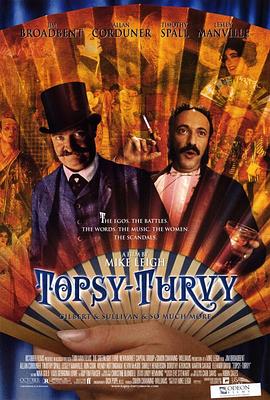详细剧情
长篇影评
1 ) 迈克·李的浮世绘
最近几年,人物传记片非常流行,一些拍的中规中矩的传记片都在奥斯卡上提了几次名,学院派青睐的那些名人传记中对于名人的真实还原、伟大成就、情感再现的电影,都透露着某种普世意味,注重挖掘人物情感甚至超越了人物本身自有的情感,反而脱离了一些让人应该感受到的真实和客观性。传记片当中那些为了励志而励志的成分,很多时候就像拍摄普通人的爱情故事或者奋斗生涯一样,只是有了一个更加能让观众八卦和感兴趣的剧本,虽然本身存在的致敬成分不会丢失,但是影片的内涵也就只是存在于剧本的打磨而不是名人本身的经历了。所以我想谈谈《酣歌畅戏》。
电影导演迈克李是我非常喜欢的一位导演,区别于长期为好莱坞拍片的诺兰、雷德利斯科特甚至近几年的盖里奇,他依然是一位非常英国本土化的导演。他的电影风格更多的是基于真实,挖掘的是平常生活中的琐碎和细节,是和好莱坞电影中那种刻意打磨精雕细刻的电影完全不同的一种类型。为了追求人物在当下情况的真实反映,导演常常是准备好一个剧本框架,让演员即兴表演,由他捕捉令人动容的细节片段,再重新加工成剧本进行有序拍摄。这样拍摄出来的电影其实更加真实、更加贴近人物本身。
《酣歌畅戏》从拍摄角度上来说,将轻歌剧还原到银幕上,和电影有机结合,演员就像真正的歌剧演员一样在台上咿咿呀呀的唱,服装精妙,形成了有趣的戏中戏;台下则是还原他们各自的性格特点,每一个歌剧演员角色并不是走马观花,都有其丰富鲜明的个性,或市侩精明,或风度优雅,或插科打诨,或轻浮挑逗,群戏十分出彩。
整个电影可以分为三部分:第一部分是吉尔伯特和沙利文之间一个重复写作嬉闹歌剧,一个渴望严肃作品创作突破自我的冲突,即将面临合作结束的危险之际,吉尔伯特偶然陪妻子逛夜市看到的日本街头艺人,引发创作《日本天皇》的灵感。第二部分则是剧本写就后,吉尔伯特和沙利文各自对于歌剧排练当中追求的真实性、艺术高度所做的努力。最后是歌剧正式演出。值得注意的是影片结尾。
影片结尾剪辑的是女演员利奥诺拉扮演的雅雅在台上唱的一段,片中刻画的绅士们都是主动的、有强烈主见的,对于绅士背后的女性就像是点到为止,来自于生活中的秘密一般,旁人不需多做琢磨,却能瞥见其处境不安,身上带着某种悲哀色彩。雅雅唱的那一段和利奥诺拉台下对着镜子前自言自语的内容都有着一定程度上,女性觉醒的意义。同样还是迈克李电影中经常会出现的对女性问题的关怀。结婚,离别,感情失败和死亡,都是他镜头当中最长注视的问题。再举一个例子,电影里吉尔伯特和妻子莉莉夫妻分房睡,或许是前面交代的父母婚姻给他造成了一定心理障碍,或者是工作太忙,他不想要孩子,他和妻子之间存在的状似无法逾越的鸿沟,更多是来自他自己设置了不愿沟通的屏障,这对于妻子莉莉无疑是一种不公。可以看做这样的家庭生活必然是不幸的。影片尾声莉莉也曾有过失控,借助写剧本来向吉尔伯特传达自己的痛苦,也只能换来吉尔伯特只以剧本论事佯装不知,给避过去了。也许传记片这样拍会更好,尊重人物本身的历史感,同时不去神话他们,祈求不犯错并不代表可以避免犯错,再伟大的人也理应有属于他的普通人的生活。
影片电影剪辑采取碎片式剪辑,由生活片段随时间推移架构出更宏观的叙事,细节就像流水账,节奏缓慢,十分任性得考验观众耐心。但是每个细节都像是一桩密事,讲述这个人物背后事迹的同时,并不是打开了一扇门而是只能往里一瞥的一扇窗,并不做足功夫去揭晓了解这个人物的答案,而是供观众自行想象。一千个观影者也是一千个哈姆雷特,以往的观影体验(特别是传记片)更多的是直陈故事发展,让观众接受人物主角本身,重点放在人物塑造的故事。而迈克李的这部传记,就像没有绝对的主角一样,只是单纯在讲两个剧作家怎样创作一部歌剧怎样排练怎样演出怎样成名的故事,故事才更加像是电影的主角,里面所有的人物都是为讲故事而服务,而还原其真实性最为可信的,就是保留角色自身原有的事件和特性,家庭不幸也好,无依无靠也好,身体孱弱病入膏肓也好,都只是需要观众自行脑补开发的属于人物自身的故事。在这一点上来说,这部电影行云流水的生活流水账,就很好得做到了细节中体现微妙的戏剧张力,不再是像其他野心勃勃的传记片电影那样消费观众,而是观众在消费电影了。
抛开内容和剪辑,电影的服装设计一流,配乐优雅,几场喜歌剧还原把现代观众更好地代入到十九世纪的维多利亚的英国大剧院当中,无论是否真懂得欣赏,这种浓厚的古典英国文艺气氛也更加具化了。同时,电影就像是轻歌剧《日本天王》一样,核心自是严肃认真的,却是用戏谑的方式表现出来,对于想看维多利亚时期英伦风貌和绅士风度,又不想电影太沉闷克制的人来说,这部电影应该会是个很不错的选择。
2 ) [Film Review] Topsy-Turvy (1999) 7.3/10

Mike Leigh’s seventh feature is a sumptuous-looking biopic about Gilbert and Sullivan, the Victorian-era theatrical partnership of the dramatist W.S. Gilbert (Broadbent) and the composer Arthur Sullivan (Corduner, a competent jazz pianist in real life), dramatizing the gestation and birth of their most successful work, the comic opera THE MIKADO, culminating on its opening night, 14th March, 1885.
With a running time edging 160 minutes, TOPSY-TURVY sees Leigh buckle down with exhaustive dedication to the period niceties, the sweeping characterization of a large ensemble and the lengthy preliminary works leading to the opening night, courageously using his troupers’ own singing voice, although it doesn’t always do the magic as he wishes, Leigh and co.’s endeavor deservedly earns two Oscars (costume design and makeup) for their craft, but fails to prosper in its box office revenue.
One major problem of the disconnection with its audience, particularly for those who are not hailed from an Anglo-Saxon background or unequipped with the reflexes of onrushing pride whenever hears the pair’s names being mentioned, is that these two main protagonists are wanting either charisma (in the case of a stuffy Gilbert, a wasted Broadbent, all prim and proper) or characteristic (Sullivan, an afflicted sybarite but the movie has too much reverence, or too little guts to go deep down that decadent path), therefore, their stories barely bite, the initial sticking point of a creative difference wrought by Sullivan’s stuck inspiration and physical exhaustion, which is presented as if he is fed up with the middle-brow librettos, that made his name and fortune, and decides to aim for a higher cause, writing a serious opera, naturally evanesces when Gilbert finally wades out of his comfort zone and mines into an untapped oriental culture. A waft of hypocrisy, yes, but there is no irony to sugar the pill.
The merely interesting note about the two arrives belatedly near the coda, the juxtaposition of Gilbert’s seemingly asexual interest in his wife Lucy (Manville, who is indomitably affecting in her constant frustration about their self-conscious childless plight, and puzzlement of why her husband is so gentlemanlike in her chamber, often leaves her to her beauty sleep on her ownsome) with Sullivan’s profligate proclivity, his mistress Fanny Ronalds (David) is pregnant again, finally sheds certain personal lights on top of their diametrical personalities, which triggers viewers a bigger question, apart from their respective talents, what makes them successful and long-time collaborators? Unfortunately, Leigh’s film has little to offer on that front.
Be that as it may, TOPSY-TURVY gets its mojo back when it tackles the kaleidoscopic aspects of those more approachable thespians, toiling on the stage, haggling for a salary raise, caviling at the costumes, showing solidarity against Gilbert’s willful decision or simply having a whale of time during their simulation process of a disparate culture. Among them, Timothy Spall is such a gas as the mainstay of the Savoy Theater in spite of his slightly hoarse and amateur vocal facility; a corset-strapped Kevin McKidd knows the trick of deadpan humor; both Dorothy Atkinson and Shirley Henderson are felicitous whether they are in or out of costume, with the latter stealing the show in the end to overpower spectators with her trademark high-pitched, child-like register.
By relating Gilbert’s out-of-the-box inspiration to Leigh, who also, for the first time, detaches himself from contemporary working class stratum, the usual fecund ground of his creations, TOPSY-TURVY shows up a lack of understanding between him and his subjects, and doesn’t live up to Leigh’s high-water mark, however boisterous and lavish the film looks, if its characters don’t click with audience, the rest can do little avail.
referential entries: Leigh’s MR. TURNER (2014, 8.1/10), ANOTHER YEAR (2010, 8.1/10).





















勘称完美的一部作品,可以进入我最喜爱的电影中,尤其是结尾,收的太完美了。影片深刻细致地勾勒出艺术创作理想与现实的矛盾又统一的关系,揭示了一部真正完美的作品最需要的是“见情”。
好的电影,就是让你看了一大半才发现是生肉但是仍旧乐在其中
对于我这种一个半小时才开始入戏的恶俗观众来说,这就是一场视觉和听觉的盛宴
迈克·李的作品看过几部,都颇喜欢,他是能够从日常生活中寻找戏剧与箴言的导演。但这一部,我实在无感,只能说古装戏不错,舞台戏不错,至于英式幽默,确实没有feel到。CC版还出过一部《日本天皇》,是一部歌剧,美国人演日本戏,似乎那戏就是该片中的那部歌剧。
英国导演迈克·李的一部以十九世纪为背景的古装剧。太长了,而且字幕较差,看了个稀里糊涂。
[CHD].Topsy-Turvy.1999.BluRay.1080p.DTS.x264-CHD酣歌畅戏 [被评选为十五年最佳一百五十部电影之一] [CC 带导评]
8.5/10。19世纪末:一对歌剧创作搭档(两男)因做不出好作品而各种关系僵化濒临闹掰,以及他们后来决定一起尽心创作一部歌剧作品《日本天皇》并最终大获成功。影片可视为一部歌舞片(只不过歌舞不是好莱坞或宝莱坞那类),有着精美的高水平摄影美术,各种歌剧段落也处理(调度剪辑编排等)地好,但作为传统故事片本片叙事较散较拖,扣1分。
2019119 二星还行
这算不算变相的纪录片啊。蒂莫西·斯波好可爱。本来想看德克斯特·弗莱彻的,却没怎么出场啊。第一次正式看莱丝利·曼维尔的演出,总忍不住遥想当年和Gary~~~
从头到尾局限的取景,镜头前的一切仿佛就发生在一个狭小的舞台空间
Gilbert and Sullivan refers to the Victorian-era theatrical partnership of the dramatist W. S. Gilbert (1836–1911) and the composer Arthur Sullivan (1842–1900) and to the works they jointly created. The two men collaborated on fourteen comic operas between 1871 and 1896.
我就说跟古典沾边的东西我不能碰……在我看来,这么华丽的投资太浪费了……
本片采用长时间全景式的拍摄方式,在传记片的书写方式上,用类似于白描流水账的方式记录这次舞台从最开始到上演的全过程,并展示参演人员的各种状况,这种方式和91年的《梵高》相同,闪光之处就在于可以极为便捷的将所处时代书写的完美至极,但与之不同的是,本片的视角并非集中,而是分散,而在传记片中做群像又不现实,这就导致了电影因人物繁杂显的冗长,而戏中戏的部分也要见仁见智了。另一方面是人物创作困境书写,此类影片最著名的要属《八部半》和《爵士春秋》了,前一部借由此来探讨个人,后一部用不断改写为发端,在场面上引入歌舞,在本片来看,两者似乎都有,但都不深入,前一部分,因为一次浏览而就解决了,导致不能深究,而后一部分又因为歌剧没有歌舞观赏性高和调度单一,导致乏味,最终令创作问题只成了串联电影发展的脉络,缺乏讨论。
迈克李电影中的台词真是非英母语观众的噩梦啊……导演写人物从来不会令人失望,但是电影前半段流水账,后半段则成了“the making of xxx”式的纪录片结构,还拍得这么长,实在是很难让观众真正投入其中。迈克李的电影拿正反打和“排排坐”撑全片其实完全可以接受,然而连歌舞场面的调度也这么偷懒就不得不吐槽了,这拍法和舞台搬演有啥区别……?
2012-146.几乎都是室内场景,道具、服装、化妆皆十分精美!另外上下可颠倒的海报相当牛啊…
有点过分长了,尤其是对于“创作过程”的展示,迈克李老师也有过困惑期。
北海看过。这一片的文本并不是特别麦克李,开宗明义的一出历史风俗剧,倒是有点像法国中尉的女人(小说)里的福尔斯。老于认出了罗马里那个百夫长啊。
temple的自语:laughter,tears,curtain.(笑声,眼泪,幕布。)
The more I see of men, the more I admire dogs.
布景和歌舞一流。写戏卖戏三位和演戏的若干位,除了他们的职业生活,感情生活也刻画得入木三分。1885年英国艺术界的女人们,已经独立起来了。